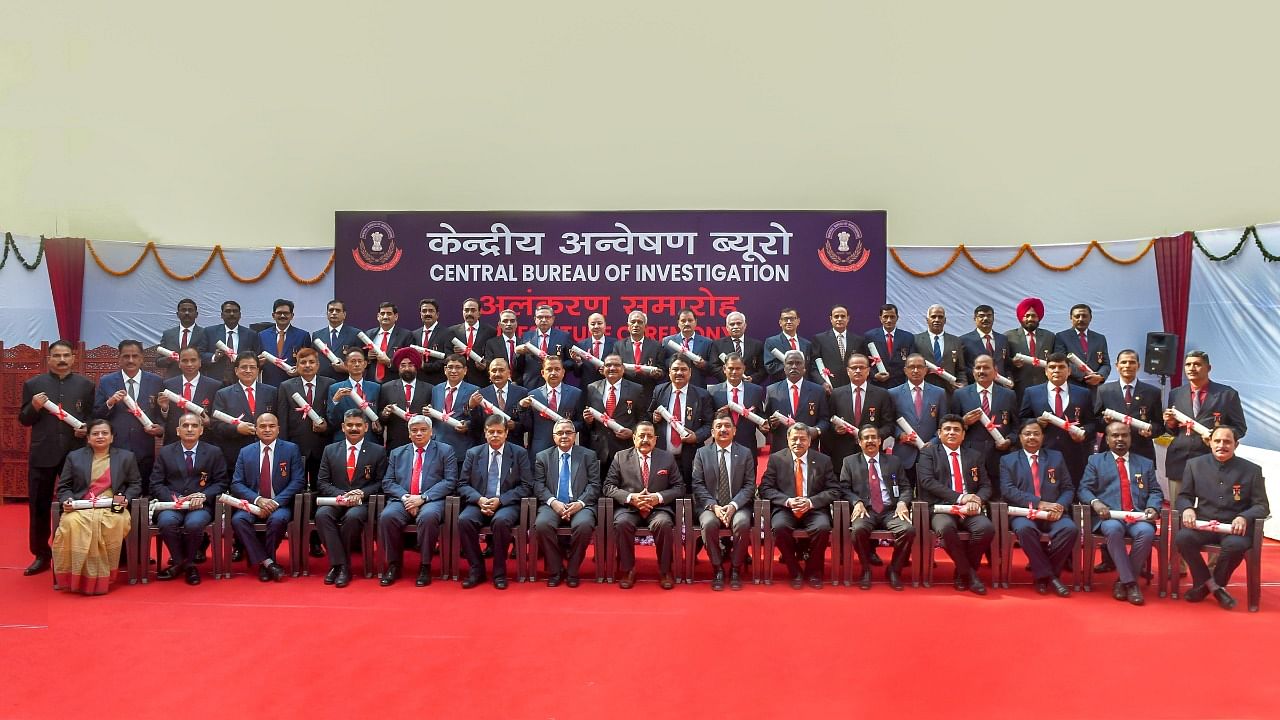
Minister of State for Personnel Jitendra Singh on Sunday said state governments have to make clear whether they trust the CBI as they are withdrawing general consent given to the agency to operate in their jurisdiction but are allowing it in selective cases referred by them under public pressure.
The minister also presented Police Medals for Meritorious Service to 47 CBI officials.
CBI Deputy SP Seema Pahuja, who probed the Hathras rape case and Himachal Pradesh's Gudia rape case, received a gold medal for best investigation officer from the minister.
Addressing the 'Investiture Ceremony', the minister of state for personnel, public grievances and pensions expressed concern that states are withdrawing the general consent given to the CBI to investigate cases but they are, nevertheless, holding on to the prerogative to give selective consent where it suits them.
Calling for wider introspection by the polity, the society and the nation at large, Singh asked whether this is the kind of propriety which is to be followed.
He said that states have to make it clear whether they trust the CBI or not, or whether they trust the agency selectively as they continue to give selective consent in cases which suits them.
According to the Delhi Special Police Establishment Act which governs the CBI, the agency needs consent from the state governments to operate in their jurisdiction. However, this consent is not required when a case is entrusted to the CBI by a High Court or Supreme Court.
Asking the state governments to "rethink" their decisions to withdraw general consent, the minister said state governments continue to refer cases to the CBI under public pressure which indicates that the people have greater trust in the agency.
"Similarly, complex and urgent cases are also assigned to the CBI by the judiciary on many occasions," he added.
The function was also attended by Chief Vigilance Commissioner Suresh N Patel and Secretary (Personnel) Pradip Kumar Tripathi.
Singh said that zero-tolerance for corruption, transparency and citizen centricity are the three main mantras that determine the administrative outlook of the government headed by Prime Minister Narendra Modi.
He said that irrespective of ideological beliefs, it is the collective responsibility of all to strengthen institutions like the CBI as these institutions also contribute to strengthening the nation's resolve to achieve the ultimate goal of incorruptibility in society.
Speaking at the function, CBI Director Subodh Kumar Jaiswal said the agency is trusted by courts, governments and the people at large.
For every serious crime, there is always a clamour for CBI investigation, he said.
"The success of the CBI is exemplified by the fact that it has over the years been able to achieve nearly 70 per cent conviction rate despite the fact that the accused are able to get the best of legal support. The CBI is committed to take forward the great legacy and adapt with time," he said.
Jaiswal said the agency has initiated a comprehensive internal process of modernisation, upgradation of capacities, setting higher benchmarks for investigation and preventive vigilance and for leveraging cutting edge capabilities to combat new age crime.
He said the CBI has identified 75 practices which need to be discouraged so as to enhance efficiency of the organisation.
The agency chief referred to a countrywide crackdown on online peddlers of child sexual exploitation material.
He said more than 5,000 individuals from more than 80 locations in India and more than 100 countries across the globe have been identified during the operation.
"We have taken note that the problems of today cannot be solved by using the skills and knowledge of yesterday," Jaiswal said.
Check out latest videos from DH: